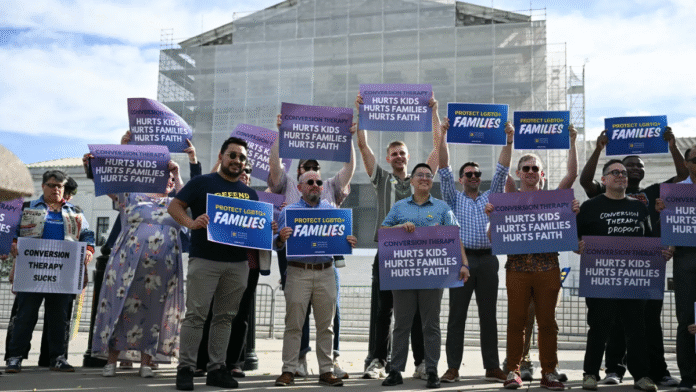The Supreme Court is signaling it may rule against a state law in Colorado that bans conversion therapy for minors. Conversion therapy is a practice that tries to change a person’s sexual orientation or gender identity. Experts say it is harmful and does not work. Studies show that children who go through conversion therapy are at a higher risk of depression, anxiety, and suicide. Minors who experience it may also run away or suffer other long-term emotional effects.
The law prevents licensed counselors from offering this therapy to minors. However, the Supreme Court’s conservative majority, including Chief Justice John Roberts, appears sympathetic to the counselor’s First Amendment argument. The main question is whether this counseling is “speech” or “medical practice.” If it is considered speech, it may be protected under the First Amendment, making it hard for states to enforce bans.
During a 90-minute hearing, justices debated whether the law could regulate counseling the same way it regulates medical treatments. Several justices emphasized that professional work does not remove free speech protections. Chief Justice Roberts noted that prior decisions treated professional speech the same as other speech, suggesting the law might be unconstitutional. Much of the discussion focused on how the state could lose rather than whether the law should stand.
Kaley Chiles, the counselor challenging the law, described her work as “faith-informed counseling” and said her sessions are voluntary. Her goal, she said, is to help clients feel comfortable with themselves. Her attorney, James Campbell, argued that Colorado cannot prove this type of counseling causes harm, noting that existing studies focus on more aggressive or coercive forms of conversion therapy.
Arguments About Safety and Harm
Colorado and other states argue that conversion therapy is unsafe and can harm children. Research shows it increases risks of mental health problems and suicide. Children subjected to conversion therapy may face depression, anxiety, and high blood pressure later in life. States say banning the practice is necessary to protect minors.
Justice Samuel Alito asked how much the court should rely on medical consensus. He noted that in the past, medical opinions have sometimes been influenced by politics or ideology and asked whether First Amendment protections might take priority in this case.
Colorado Solicitor General Shannon Stevenson told the court that conversion therapy has never been proven effective and that the harm comes from telling children there is something about themselves that needs to be changed. Justice Amy Coney Barrett pressed for evidence that the practice causes harm, reflecting the conservative justices’ focus on whether the state can justify restricting speech, not just the therapy itself.
Court Dynamics and Reactions
The hearing was brief and calm for such a sensitive issue. Justice Ketanji Brown Jackson questioned why this case might differ from a recent case that limited state control over medical care for minors, raising concerns about consistency in the court’s approach.
Justice Brett Kavanaugh remained silent during the session, which surprised observers. Overall, the justices focused on whether counseling should be treated as speech, which would receive First Amendment protection, or as conduct that can be regulated by the state.
The session highlighted the tension between protecting minors and defending free speech rights. The Supreme Court’s conservative majority, including Roberts, Barrett, and Alito, appeared inclined to favor free speech protections. This approach could make state bans on conversion therapy legally vulnerable, with the case centered on the boundaries of speech and counseling rights rather than the therapy’s effectiveness.


